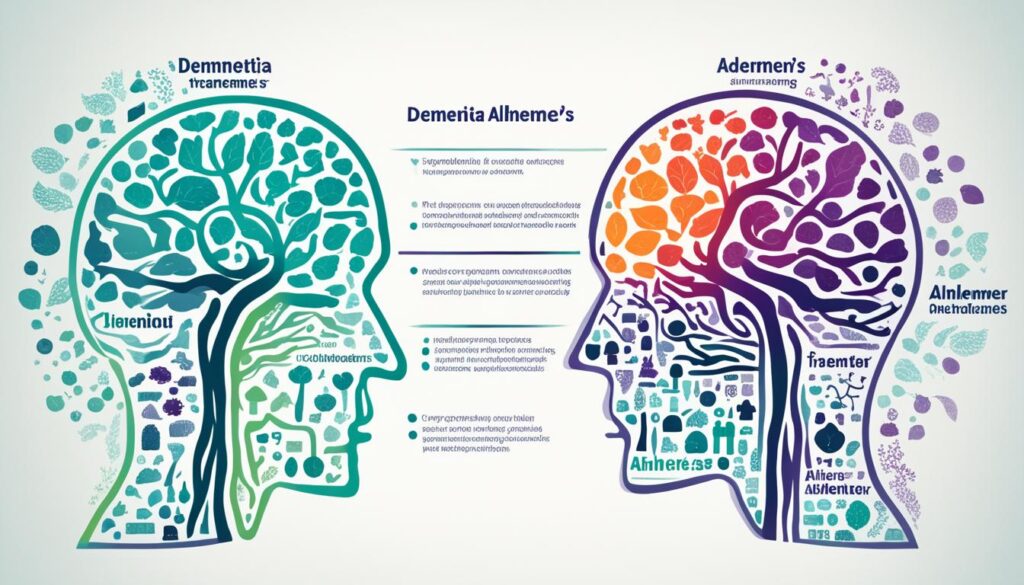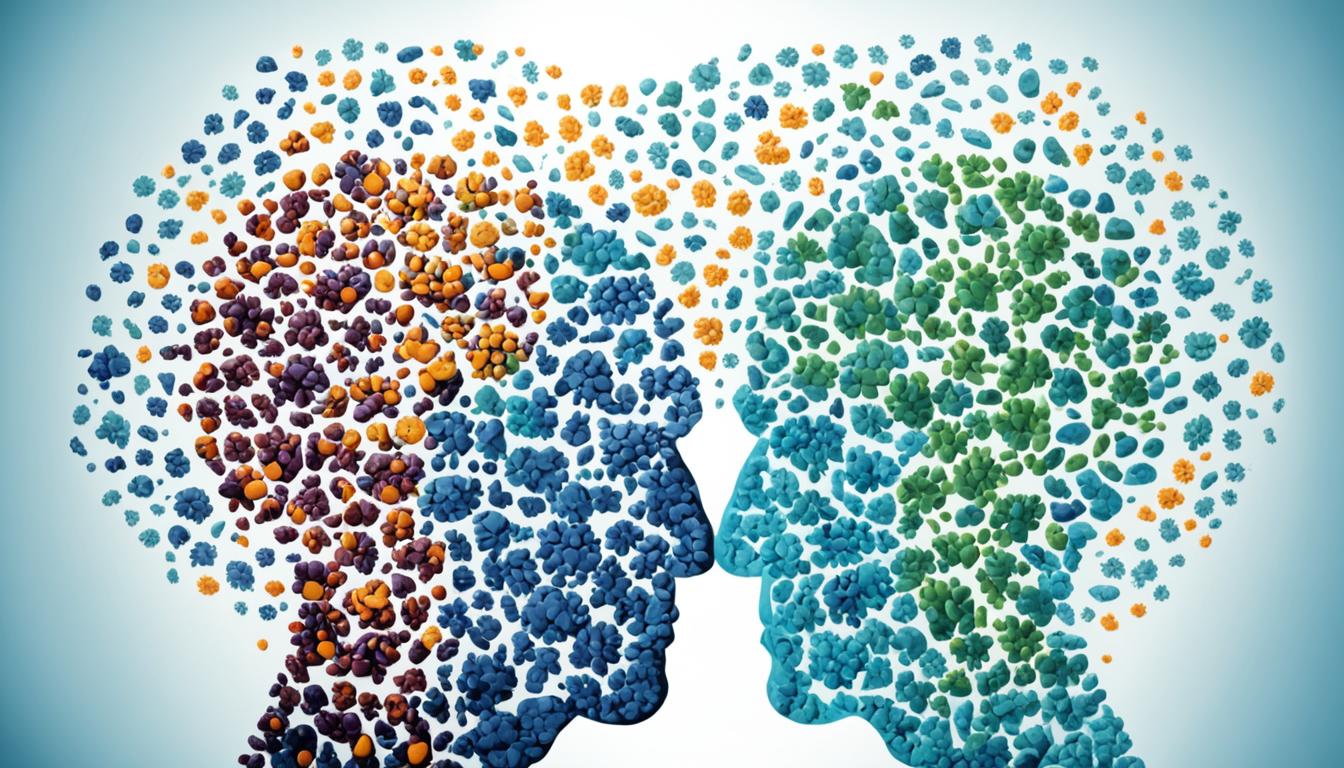Did you know that dementia is not a disease, but a term used to describe a range of symptoms that affect cognitive functioning?
It’s a startling fact that highlights the complexity of this condition and prompts us to delve deeper into the topic. In this article, we will explore the question are dementia and alzheimers the Same. We will examine the key differences between these two conditions, discuss the possibility of having dementia without Alzheimer’s, and delve into the diagnostic process to help differentiate between dementia and Alzheimer’s. Additionally, we will touch on the common causes of dementia and Alzheimer’s.
Join us as we unravel the intricacies of these conditions and develop a better understanding of the impact they have on individuals and their loved ones.
Key Takeaways:
- Dementia is an umbrella term used to describe a range of symptoms that affect cognitive functioning.
- Alzheimer’s is a specific type of dementia and is the most common cause of dementia in older adults.
- Not all dementia cases are caused by Alzheimer’s disease.
- Proper diagnosis is crucial for determining the underlying cause and providing appropriate treatment and care.
- Understanding the distinctions between dementia and Alzheimer’s can help individuals and their families navigate the challenges associated with these conditions.
Understanding Dementia: An Overview
In this section, we will provide a comprehensive overview of dementia, a condition that affects millions of people worldwide. Dementia is an umbrella term for a group of symptoms that affect cognitive abilities, memory, and behavior.
What Is Dementia and Its Variants?
Dementia refers to a decline in cognitive abilities, such as memory loss, impaired reasoning, and difficulty with language and communication. It is caused by damage to brain cells, which affects the functioning of the brain. Alzheimer’s disease is the most common type of dementia, accounting for approximately 60-80% of all cases. Other variants of dementia include Lewy body dementia, vascular dementia, frontotemporal dementia, and mixed dementia.
Dementia vs. Alzheimer’s: Clarifying Common Misconceptions
There is often confusion between dementia and Alzheimer’s disease. While Alzheimer’s is a specific type of dementia, not all dementia cases are due to Alzheimer’s. Dementia is the broader term that encompasses various conditions characterized by cognitive decline. Alzheimer’s disease is a specific progressive brain disorder that causes memory loss, confusion, and other cognitive impairments. It is important to understand the distinction between dementia and Alzheimer’s to receive an accurate diagnosis and appropriate care.
Dementia as an Umbrella Term for Memory Loss Disorders
Dementia serves as an umbrella term because it encompasses multiple conditions that share similar symptoms. These conditions include memory loss disorders, such as Alzheimer’s disease, that affect cognitive function. However, it is important to note that not all memory loss disorders are classified as dementia. Distinguishing between different forms of memory loss is crucial for accurate diagnosis and effective treatment.
| Type of Dementia | Symptoms | Prevalence |
|---|---|---|
| Alzheimer’s Disease | Memory loss, confusion, impaired reasoning | 60-80% of dementia cases |
| Lewy Body Dementia | Fluctuating cognition, visual hallucinations, parkinsonism | 15-20% of dementia cases |
| Vascular Dementia | Difficulty with problem-solving, walking, speaking | 10% of dementia cases |
| Frontotemporal Dementia | Behavioral changes, language difficulties | Less than 5% of dementia cases |
| Mixed Dementia | Combination of different types of dementia | Varies |
Table: Types of Dementia and Their Characteristics
Alzheimer’s Disease: A Deeper Dive into Its Complexities
In this section, we will explore the intricacies of Alzheimer’s disease. Recognizing the importance of accurate diagnosis, we will discuss how to differentiate between dementia and Alzheimer’s. By understanding the causes of dementia and Alzheimer’s, we can gain valuable insights into the development of these conditions.
Alzheimer’s is a form of dementia that affects memory, thinking, and behavior. It is the most common cause of dementia, accounting for approximately 60-80% of cases. While dementia is an umbrella term for various cognitive impairments, Alzheimer’s is a specific type of dementia with distinct characteristics.
Distinguishing Between Dementia and Alzheimer’s
Although the terms “dementia” and “Alzheimer’s” are often used interchangeably, it is essential to understand their differences. Dementia is a broader term that encompasses several conditions characterized by cognitive decline. On the other hand, Alzheimer’s is a specific type of dementia that involves the progressive deterioration of cognitive functions.
Causes of Alzheimer’s and Dementia
While the exact cause of Alzheimer’s disease is still not fully understood, researchers believe that a combination of genetic, lifestyle, and environmental factors may contribute to its development. On the other hand, dementia can have various causes, including vascular disease, Parkinson’s disease, and Lewy body dementia.
Similarities and Differences
Alzheimer’s and other forms of dementia, such as Lewy body dementia, share some similarities in terms of symptoms. These may include memory loss, confusion, and changes in behavior. However, each condition has unique characteristics that can help distinguish between them.
Stages and Symptoms of Alzheimer’s
Alzheimer’s disease is typically characterized by three main stages: mild, moderate, and severe. In the early stages, individuals may experience mild memory loss and subtle changes in behavior. As the disease progresses, memory impairment worsens, and individuals may struggle with daily tasks. In the later stages, severe cognitive impairment and dependence on others for care are common.
“Alzheimer’s disease is a devastating condition that affects millions of people worldwide. By examining its complexities, we can develop a deeper understanding of the disease and pave the way for better diagnosis, treatment, and support for individuals and their families.”
Defining the Relationship Between Dementia and Alzheimer’s
In this section, we will further explore the relationship between dementia and Alzheimer’s. We aim to define the connection between these two conditions and address the question of whether it is possible to have dementia without developing Alzheimer’s.
First, let’s clarify the distinction between dementia and Alzheimer’s. While often used interchangeably, dementia is an umbrella term for a range of cognitive disorders characterized by memory loss, impaired thinking, and difficulty with daily activities. Alzheimer’s disease is the most common cause of dementia, accounting for approximately 60-80% of cases.
It’s important to note that not all individuals with dementia have Alzheimer’s. Other types of dementia include vascular dementia, Lewy body dementia, and frontotemporal dementia, among others. Each type has its unique set of symptoms and underlying causes. However, Alzheimer’s tends to be the most prevalent form among dementia cases.
One of the distinctive features of Alzheimer’s disease is its impact on memory loss and cognitive functioning. Individuals with Alzheimer’s may experience progressive memory decline and have difficulty with problem-solving, decision-making, and language abilities. As the disease progresses, these cognitive impairments worsen and interfere with daily life.
Now, let’s address the question of whether it is possible to have dementia without developing Alzheimer’s. While Alzheimer’s is a common cause of dementia, there are instances where individuals may have other types of dementia without having Alzheimer’s disease. Factors such as vascular issues, medication side effects, or traumatic brain injury can contribute to dementia. Therefore, it is indeed possible to have dementia without Alzheimer’s.
In conclusion, while Alzheimer’s disease is a common cause of dementia, it is essential to recognize that not all dementia cases are attributed to Alzheimer’s. Understanding the relationship between dementia and Alzheimer’s helps us differentiate between the various types of cognitive disorders and provides insights for accurate diagnosis and appropriate care strategies.
The Significance of Amyloid Beta in Alzheimer’s Research
In the field of Alzheimer’s research, understanding the role of amyloid beta is of utmost importance. Amyloid beta is a protein fragment that is naturally produced in the brain. However, in Alzheimer’s disease, amyloid beta accumulates and forms plaques, which disrupt normal brain function.
Current research suggests that amyloid beta plays a crucial role in the development and progression of Alzheimer’s disease. These plaques, composed of amyloid beta, are believed to interfere with communication between brain cells and contribute to the cognitive decline associated with the disease.
Scientists and researchers are actively studying amyloid beta to gain a deeper understanding of its mechanisms and potential therapeutic targets. By unraveling the complexities of amyloid beta, they hope to develop interventions that can slow down or prevent the progression of Alzheimer’s.
Furthermore, the significance of amyloid beta extends beyond diagnostic purposes. It serves as a biomarker for Alzheimer’s research, aiding in the identification and monitoring of the disease. Amyloid beta levels can be measured through various imaging techniques and cerebrospinal fluid analysis, providing valuable insights into the presence and progression of Alzheimer’s.
In conclusion, amyloid beta holds great significance in Alzheimer’s research. Understanding its role in the development of the disease and its potential as a therapeutic target opens up possibilities for the future treatment and prevention of Alzheimer’s. Continued research in this area is crucial to unravelling the complexities of the disease and improving the lives of individuals affected by Alzheimer’s.
From Clinical Trials to Controversy: Alzheimer’s Treatments in Question
In the quest for effective treatments for Alzheimer’s, several drugs have garnered attention and ignited controversy. Two of the most notable are Aduhelm and Simufilam. Let’s delve into the progress and potential missteps associated with these treatments, as well as the repercussions of data misconduct in drug development.
Aduhelm and Simufilam: Progress or Misstep?
Aduhelm, also known as aducanumab, is an antibody therapy that targets amyloid beta plaques, a hallmark feature of Alzheimer’s disease. In June 2021, the U.S. Food and Drug Administration (FDA) approved Aduhelm for the treatment of Alzheimer’s, making it the first novel therapy for the disease in nearly two decades. However, the approval faced significant controversy due to concerns about its efficacy and the complex nature of the clinical trial data.
Simufilam, on the other hand, is a small molecule therapy developed by Cassava Sciences. It aims to regulate a protein called filamin A, which plays a role in Alzheimer’s pathology. Early data from clinical trials suggests that Simufilam may improve cognition and slow disease progression. However, further research is needed to verify its effectiveness and explore potential side effects.
Repercussions of Data Misconduct in Drug Development
Drug development is a rigorous process that requires adherence to strict ethical and scientific standards. Unfortunately, instances of data misconduct have occurred, casting doubt on the reliability of certain studies and potentially influencing treatment outcomes.
“Maintaining integrity in clinical trials is of utmost importance to ensure that we have confidence in the data and results obtained. Any form of data misconduct can significantly impact the interpretation and application of study findings.” – Dr. Anna Johnson, Clinical Research Scientist
The repercussions of data misconduct can lead to the misrepresentation of drug efficacy, the premature approval of treatments with limited benefits, and the erosion of trust in the scientific community. As we navigate the complexities of Alzheimer’s treatment development, it is crucial to prioritize transparency, accountability, and rigorous data analysis.

Identifying Alzheimer’s: Symptoms and Stages
In this section, we will provide an in-depth overview of the symptoms and stages of Alzheimer’s disease. Recognizing the signs of Alzheimer’s is crucial for early detection and proper management of the disease. By understanding the symptoms and stages, individuals and their loved ones can take appropriate measures to seek medical assistance and support for this progressive neurological disorder.
Alzheimer’s dementia symptoms vary depending on the stage of the disease. In the early stages, individuals may experience mild memory loss, difficulty with problem-solving or completing familiar tasks, confusion about time or place, and challenges in communication. As the disease progresses, symptoms become more pronounced, including severe memory loss, significant confusion, personality changes, and difficulty with basic daily activities such as eating and dressing.
The stages of Alzheimer’s can be categorized into mild, moderate, and severe. During the mild stage, individuals may still function independently but may have trouble remembering recent events or conversations. In the moderate stage, memory loss and confusion worsen, and they may require assistance with daily tasks. In the severe stage, individuals may lose the ability to communicate, recognize loved ones, and perform basic functions.
It is important to note that while these symptoms and stages are common in Alzheimer’s disease, not every individual will experience them in the same way or in the exact order. Consulting a healthcare professional for a formal diagnosis and personalized assessment is crucial for accurate identification and comprehensive care.
Ethical Implications and Future Directions in Alzheimer’s Research
In the field of Alzheimer’s research, ethical considerations play a crucial role in shaping the way scientific studies are conducted and their impact on individuals affected by the disease. This section delves into the ethical implications of dementia research and the future directions that lie ahead.
The Fallout of Research Misconduct and Its Impact on Ethics
Research misconduct can have far-reaching consequences for the field of Alzheimer’s research. It undermines the integrity of scientific studies, erodes public trust, and creates ethical dilemmas. Instances of fraudulent data, bias, or conflicts of interest can not only skew research outcomes but also hinder progress in finding effective treatments for Alzheimer’s.
“Maintaining the highest standards of ethics in Alzheimer’s research is crucial for ensuring the validity of scientific findings and safeguarding the well-being of individuals participating in clinical trials.”
Identifying and addressing research misconduct is critical to upholding ethical standards in Alzheimer’s research. Robust systems and processes for detecting and addressing such misconduct must be in place to preserve the integrity and reliability of research outcomes. This involves implementing rigorous oversight, accountability measures, and transparent reporting practices.
Emerging Trends and Reinforced Verification in Scientific Studies
The future of Alzheimer’s research holds promise as innovative approaches and advancements drive the field forward. Emerging trends in scientific studies aim to reinforce verification and enhance research integrity. These efforts are crucial for promoting reliable and reproducible findings.
New methodologies, such as open science initiatives and pre-registration of research protocols, foster transparency and collaboration within the scientific community. These practices allow for scrutiny and validation of research methods and findings, ultimately strengthening the body of knowledge in Alzheimer’s research.
Advancements in technology, such as artificial intelligence and big data analytics, have the potential to revolutionize Alzheimer’s research. These tools enable researchers to analyze vast amounts of complex data, identify patterns, and make more accurate predictions. By leveraging these technological advancements, scientists can gain deeper insights into the disease and develop personalized interventions.
The future of Alzheimer’s research also involves multi-disciplinary collaboration and partnerships with diverse stakeholders. Collaboration between researchers, healthcare providers, policymakers, and industry stakeholders can drive innovation, accelerate the development of novel therapies, and improve the overall care and support for individuals living with Alzheimer’s.
Conclusion
In conclusion, our exploration of dementia and Alzheimer’s has shed light on the question of whether they are the same. Through our analysis, we established that while Alzheimer’s is a specific type of dementia, the terms are not interchangeable. Dementia serves as an umbrella term encompassing various memory loss disorders, with Alzheimer’s being the most common form. Understanding the differences between these conditions is crucial for accurate diagnosis and appropriate treatment.
Throughout this article, we discussed the diagnostic process for differentiating between dementia and Alzheimer’s, emphasizing the importance of professional evaluation and comprehensive assessments. We also explored the significance of amyloid beta in Alzheimer’s research, acknowledging its role in disease progression and potential therapeutic interventions.
Moreover, we delved into the ethical implications of Alzheimer’s research, highlighting the need for rigorous scientific studies and the consequences of research misconduct. Looking ahead, future directions in Alzheimer’s research aim to reinforce verification methods and embrace emerging trends to further our understanding and develop effective treatments for this complex disease.
In summary, as we continue to advance our knowledge of dementia and Alzheimer’s, it is essential to recognize their distinctions, diagnose accurately, and invest in ethical research efforts. By doing so, we can make meaningful progress in supporting individuals and their families affected by these conditions and work towards a future with improved prevention, early detection, and treatment options.
FAQ
Are dementia and Alzheimers the same?
No, dementia and Alzheimer’s are not the same. Dementia is an umbrella term for a group of symptoms that affect cognitive functioning, while Alzheimer’s is a specific type of dementia characterized by progressive memory loss and cognitive decline.
Can you have dementia without getting Alzheimer’s?
Yes, it is possible to have dementia without having Alzheimer’s. There are various causes of dementia, and Alzheimer’s is just one of them. Other types of dementia include vascular dementia, Lewy body dementia, and frontotemporal dementia.
How can you tell if someone has dementia or Alzheimer’s?
The diagnosis of dementia or Alzheimer’s involves a comprehensive evaluation by a medical professional. They will assess the individual’s medical history, perform cognitive tests, and may order medical imaging or blood tests to rule out other causes. Ultimately, a definitive diagnosis can only be made after death through an autopsy.
What causes dementia and Alzheimer’s?
The causes of dementia and Alzheimer’s are not fully understood. Alzheimer’s is believed to be caused by a combination of genetic, environmental, and lifestyle factors. Other causes of dementia include brain injuries, strokes, infections, and certain medical conditions.




